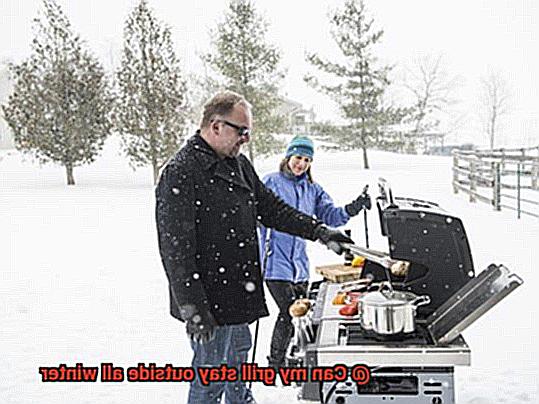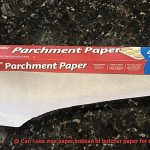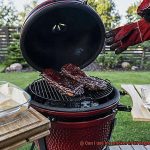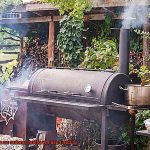Winter is just around the corner, and that means it’s time to start thinking about how to protect your outdoor equipment from the harsh weather conditions. But as a grill enthusiast, you may be wondering if you really need to pack up your grill and store it away until spring. Can your grill stay outside all winter? Well, the answer isn’t a simple yes or no.
If you’re someone who loves grilling even in the dead of winter, leaving your grill outside might seem like a convenient solution. However, before making that decision, there are several key factors to consider. Will your grill withstand the freezing temperatures and snow? Will its parts freeze or rust? Will it maintain its quality over time?
Don’t worry though – in this blog post, we’ll provide you with all the information you need to make an informed decision about whether or not to store your grill for the winter. We’ll explore both sides of the debate and give you some helpful tips on how to protect your beloved grill from the elements if you do decide to leave it outside.
So grab a cup of cocoa and let’s dive into whether or not your grill can brave the winter months.
Contents
Types of Grills and Their Winter Durability
Winter grilling is a great way to enjoy delicious meals while enjoying the crisp winter air. However, before you pull out your grill and start cooking, it’s essential to consider the type of grill you have and its durability in cold temperatures. In this article, we will explore the different types of grills and their winter durability.
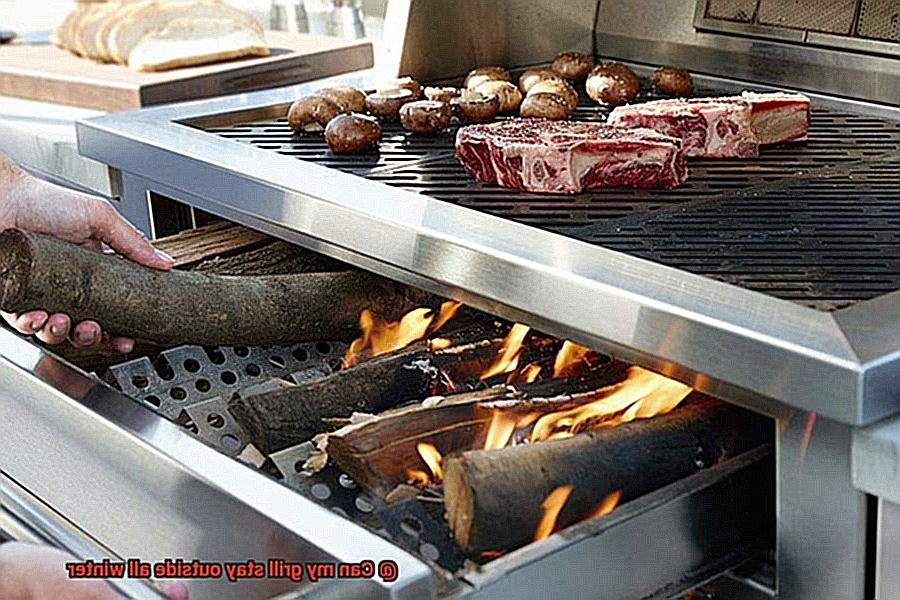
Gas Grills
Gas grills are a popular choice for many outdoor cooks due to their convenience and ease of use. However, when it comes to winter weather, gas grills may not be the most durable option. The cold temperatures can cause issues with the gas lines and regulators, making it difficult to get the grill up and running. Additionally, the metal components of the grill can contract and expand with temperature changes, which can cause damage over time. Snow and ice accumulation can also cause damage to the grill’s exterior and even lead to rusting over time.
Charcoal Grills
Charcoal grills are a classic option for those who love the smoky flavor that comes with cooking over charcoal. When it comes to winter durability, charcoal grills may fare better than gas grills since they don’t rely on gas lines or regulators. Charcoal grills also require less maintenance since they don’t have many mechanical or electronic parts that can be affected by the cold. However, snow and ice can still cause damage to the grill’s exterior and lead to rusting if not properly maintained.
Electric Grills
Electric grills are becoming more popular due to their convenience and ability to be used indoors or outdoors. When it comes to winter durability, electric grills may be the best option since they don’t rely on gas or charcoal and can easily be moved indoors if needed. Electric grills are also less susceptible to damage from snow and ice accumulation since they don’t have any metal components that can rust.
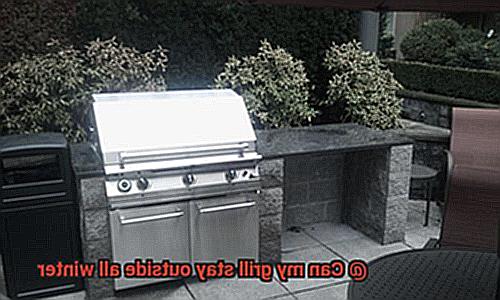
Pellet Grills
Pellet grills are another popular type of grill that uses wood pellets for fuel. These grills offer great temperature control and versatility in cooking but may require extra maintenance during the winter months. Pellet grills can be susceptible to damage in extreme cold temperatures, and the wood pellets can absorb moisture from snow and ice, making them difficult to use.
In conclusion, when it comes to winter grilling, it’s important to consider the type of grill you have and its potential durability during winter weather conditions. While some grills may require extra maintenance or protection during the winter months, others may be more resilient and better suited for year-round use.
The Climate Factor in Leaving Your Grill Outside
Before you fire up your grill, let’s talk about the vital factor of climate and how it affects leaving your grill outside during the winter.
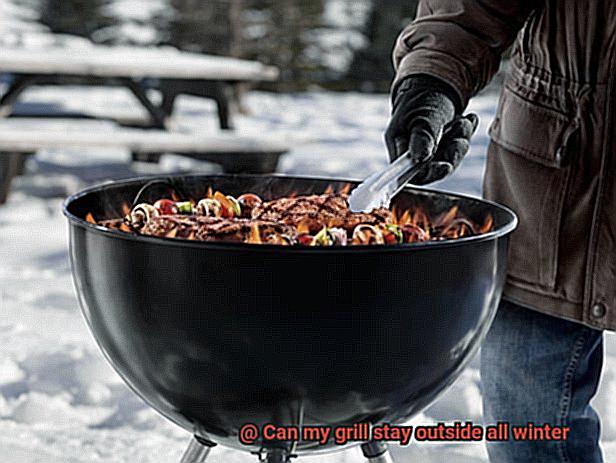
The climate factor is one of the most critical things to consider when making this decision. Different regions have different climates, and each can significantly impact your grill’s performance and lifespan. If you live in an area with heavy snowfall, your grill may be vulnerable to rust and damage due to the moisture from the snow. In contrast, if you live in a region with a lot of rain, your grill may suffer from water damage and corrosion. So, it’s crucial to understand the weather conditions in your area before leaving your grill outside.
Extreme temperatures can also affect your grill’s performance. If the temperature drops too low, the propane tank may not work correctly, and the grill may not ignite or heat up as it should. Moreover, cold weather can cause metal parts to contract and expand, leading to warping and cracking over time. This can shorten the lifespan of your grill if left unprotected.
However, that’s not all – leaving your grill outside during winter can also affect its overall efficiency. If you don’t cover it adequately or leave it exposed to the elements, debris and dirt can accumulate inside the grill. This will impact its heat distribution and make cleaning more difficult. As a result, you may end up with uneven cooking results and spend more time cleaning up after your grilling sessions.
So, what can you do to ensure your grill survives the winter season? The key is taking precautions. Invest in a high-quality grill cover that fits snugly over your grill to protect it from snow, rain, and debris. Additionally, storing your propane tank indoors when not in use can help keep it functioning correctly.
Protecting Your Grill in the Winter
Winter can be a harsh season for your beloved grill, but with some easy precautions, you can keep it in top condition for many years to come. As an expert on protecting your grill in the winter, I have compiled some research notes and tips to help you keep your grill safe and sound during the colder months.
Investing in a high-quality grill cover that is specifically designed to withstand the harsh winter weather is the first step to protecting your grill. A good cover will protect your grill from snow, ice, and other debris that could damage its exterior. It will also prevent moisture from getting inside and causing rust or corrosion.
Thoroughly cleaning your grill before storing it for the winter is also crucial. This means removing any leftover food or grease and scrubbing the grates and interior surfaces with a grill brush or scraper. After cleaning, it’s a good idea to coat the grates and other metal surfaces with a thin layer of cooking oil to prevent rust and corrosion.
If you plan on leaving your grill outside all winter, it’s important to keep an eye on the weather forecast and take additional precautions when necessary. For example, if there’s a heavy snowfall or ice storm expected, you may want to shovel snow away from your grill or cover it with an extra layer of protection such as a tarp or blanket.
Disconnecting the propane tank and gas line from your gas grill before storing it for the winter is incredibly important. This will help prevent leaks or other safety hazards that could occur if the gas were left on.
To summarize:
- Invest in a high-quality winter-proof cover
- Thoroughly clean your grill before storing it
- Coat grates and metal surfaces with oil
- Keep an eye on weather forecasts and take additional precautions
- Disconnect propane tank and gas line from gas grills
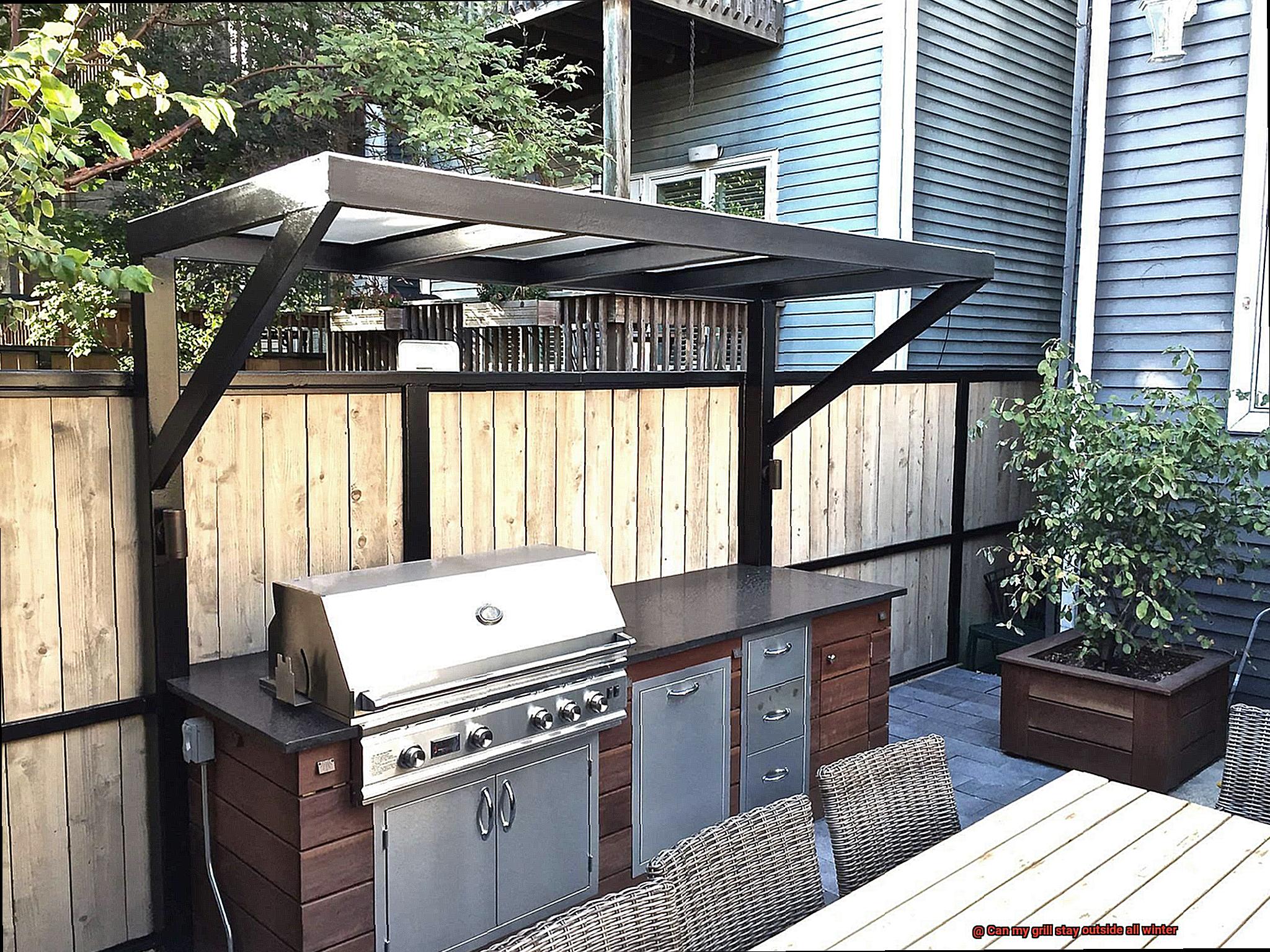
Gas Grills vs Charcoal Grills During the Winter
As an expert in this field, let’s weigh the pros and cons of each option to help you make an informed decision.
Gas grills are a popular choice during the winter months due to their ease of use. They can be started quickly and heat up faster than charcoal grills, making them ideal for those who want to get grilling right away. Gas grills also maintain a consistent temperature throughout the cooking process, which is essential when grilling in colder weather. Additionally, they are low maintenance and require minimal attention.
However, gas grills cannot match the smoky flavor that charcoal grills provide. So, if you are someone who loves that classic smoky taste in your food, you may want to consider a charcoal grill instead. Charcoal grills are known for their ability to produce that perfect smoky flavor that many people crave. But, they require more time and effort to get started in colder temperatures and take longer to heat up than gas grills. Charcoal grills also need more attention while cooking.
When deciding between gas and charcoal for winter grilling, it is essential to consider your personal preferences as well as the conditions you will be cooking in. If convenience and ease of use are your top priorities, a gas grill is the way to go. But if you are willing to put in some extra effort for that delicious smoky flavor, then a charcoal grill is worth considering.
To keep your grill safe during the winter months, invest in a high-quality winter-proof cover, clean your grill thoroughly before storing it away, and disconnect propane tanks and gas lines from gas grills when not in use.
Tips for Keeping Your Grill Safe During Extreme Weather Conditions
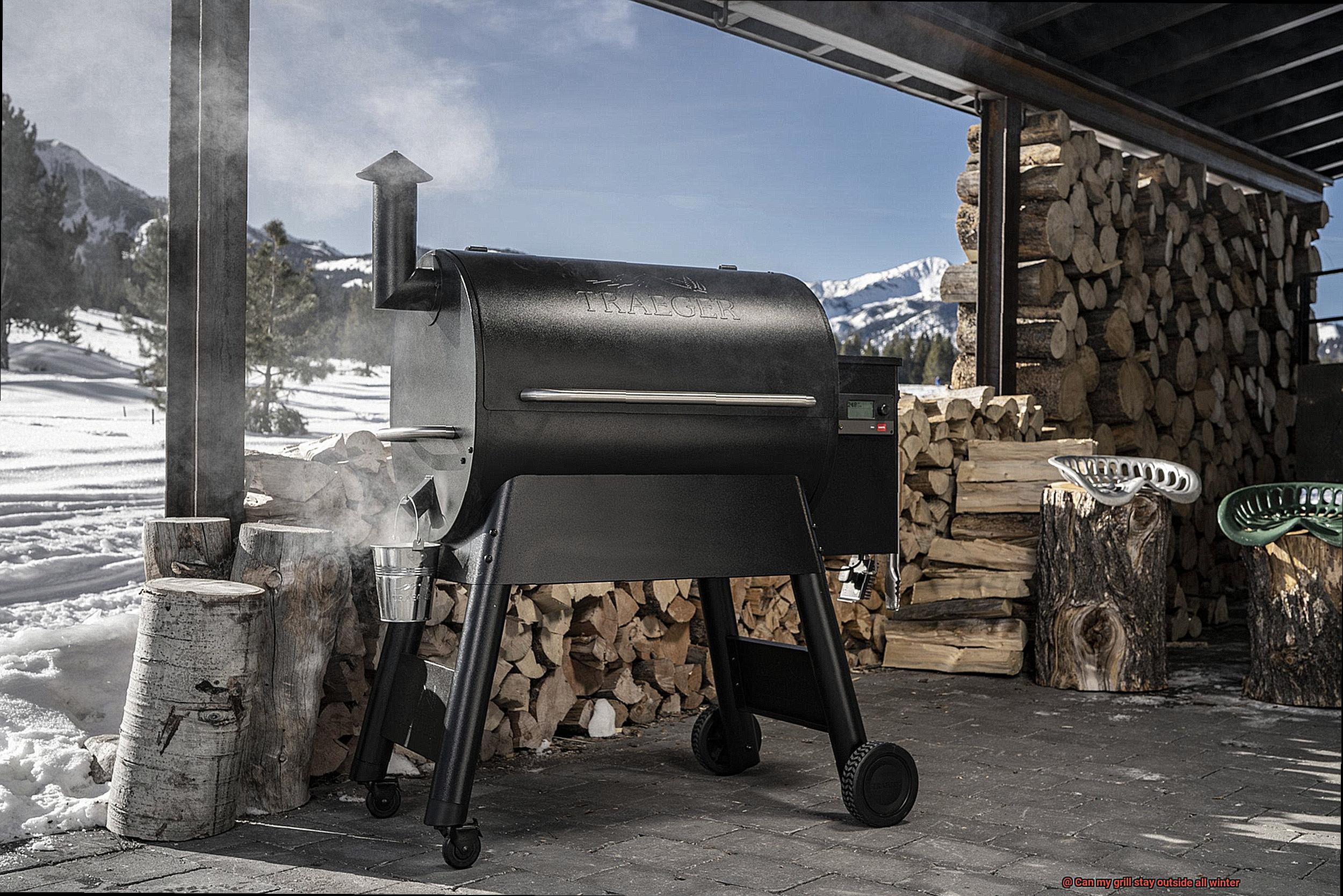
With some simple tips and maintenance, your grill can withstand the harsh winter weather and remain in good condition for use throughout the season.
Invest in a High-Quality Cover
A high-quality cover is one of the most important investments you can make for your grill. It will protect your grill from snow, ice, and other elements that can cause damage or corrosion. Make sure to choose a cover that fits properly and is securely fastened so that it doesn’t blow off in high winds.
Regularly Clean Your Grill
Cleaning your grill regularly is essential for keeping it in good condition. This includes cleaning the grates, burners, and any other parts of the grill that come into contact with food or grease. It’s also a good idea to use a protective spray or oil on the grill grates to prevent rusting.
Clear Snow Off Your Grill
Heavy snowfall can cause damage to your grill if left unattended. Snow can build up on the cover and add extra weight, which can cause damage or even collapse the cover. Use a soft-bristled brush or broom to gently remove any snow from the cover and the grill itself.
Protect Your Propane Tank
Cold temperatures can cause propane tanks to freeze, which can lead to leaks or other safety hazards. It’s recommended to store your propane tank in a warm location or invest in a propane tank blanket to keep it from freezing.
Follow Safety Precautions
When using your grill during extreme weather conditions, it’s important to take extra precautions for safety. Keep your grill at least 10 feet away from any structures or flammable materials, as well as ensuring that your grill is properly ventilated to prevent carbon monoxide buildup. Always use proper lighting techniques and make sure that the grill is fully extinguished when you’re done using it.
What to Do if You Live in a Harsh Winter Climate
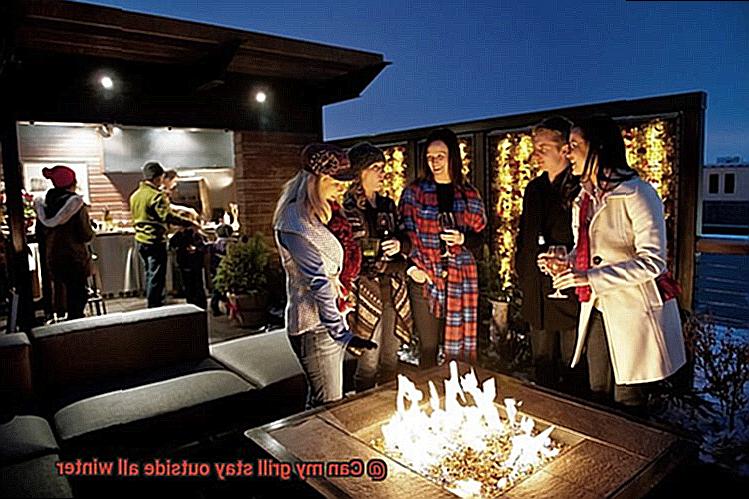
With proper care and attention, it is possible to keep your grill in great condition throughout the winter months. Here are five tips to help you care for your grill in a harsh winter climate:
Invest in a high-quality cover
The first step in protecting your grill from the elements is to invest in a good quality cover. Choose a cover that fits snugly over your grill and is made of durable, weather-resistant material. This will help prevent rust and other damage caused by snow, ice, and moisture.
Store your grill in a sheltered area
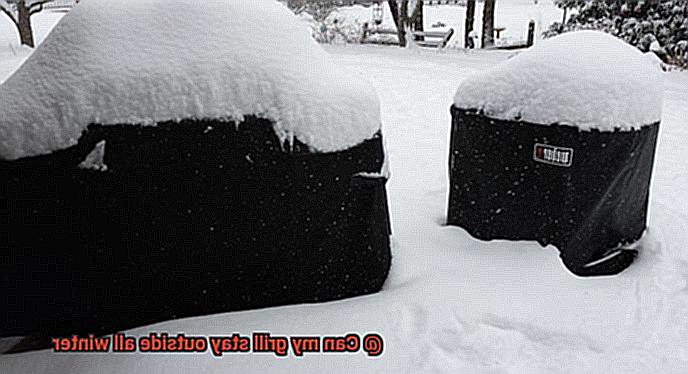
If possible, store your grill indoors in a garage or shed. This will help protect it from the harsh winter weather. If indoor storage is not an option, consider using a grill storage bag to protect it from the elements.
Clean your grill thoroughly
Before storing your grill for the winter, it is crucial to clean it thoroughly. Remove any food residue, grease, or debris from the grates and burners. This will help prevent rust and corrosion from developing on the metal parts of your grill.
Choose the right fuel
Charcoal grills can be more difficult to use in cold weather as the charcoal may not heat up as quickly or evenly. Gas grills are generally easier to use in winter, but make sure you check the fuel levels regularly and be prepared for potential issues with ignition. It’s also important to store propane tanks indoors or in a sheltered area as extreme cold temperatures can cause them to freeze.
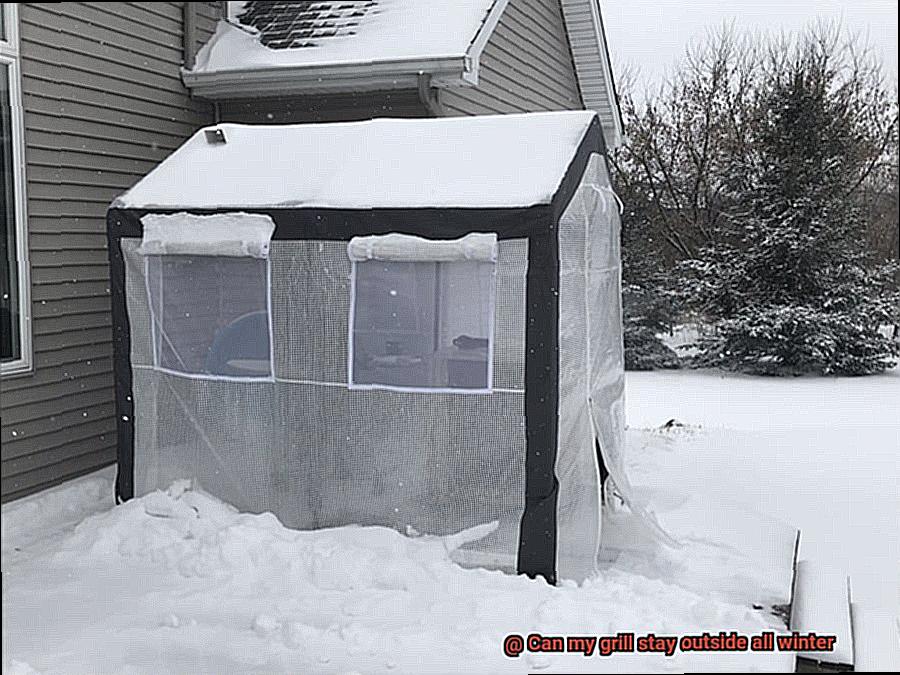
Clear a path to your grill
If you plan on using your grill during the winter months, make sure you clear a path to it. Heavy snowfall can make it difficult to access your grill safely. Clearing a path will ensure you can safely reach your grill without slipping or falling.
Benefits of Keeping Your Grill Outdoors All Year Round
If so, keeping your grill outdoors all year long can bring you a multitude of benefits. Here are just a few reasons why you should consider keeping your grill outside.
First and foremost, having your grill accessible at all times means you won’t have to worry about storage or thawing before cooking up a storm. With your grill outside, you can whip up a scrumptious meal at any time, regardless of the weather.
Additionally, when kept outside, your grill is exposed to natural elements like wind and sun that can actually help prolong its life. These elements prevent rust and corrosion from forming and keep moisture from building up inside the grill, which can cause damage over time.
But the advantages don’t end there. Keeping your grill outside can also add to the overall ambiance of your outdoor space. A grill can be a focal point on your patio or backyard, creating a warm and inviting atmosphere that’s perfect for entertaining guests or spending quality time with family and friends.
Common Mistakes to Avoid When Leaving Your Grill Outdoors During the Winter
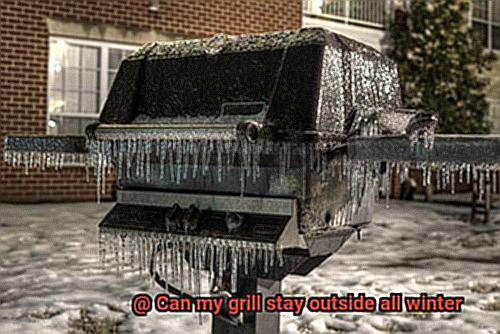
Winter is the perfect time to enjoy grilled meals outside, but it’s essential to avoid common mistakes that could damage your grill or make it unsafe to use. Here are some tips to ensure that you can keep grilling during the colder months:
- Cover your grill: Leaving your grill uncovered during the winter can cause snow and ice buildup, leading to significant damage. Plus, moisture from snow and ice can encourage rust formation, which is tough to remove. Protect your grill with a proper cover to keep it in great shape.
- Clean your grill: Cleaning your grill thoroughly before storing it for the winter is crucial. Leftover food particles, grease, and debris can lead to bacterial buildup that can be harmful to your health. Make sure you clean all parts of the grill, including the grates and inside of the grill.
- Disconnect propane or gas tanks: Leaving propane or gas tanks attached to your grill during winter is dangerous. Cold weather can damage tanks, leading to leaks or other safety hazards. Disconnect and store your tanks in a safe place during the winter months.
- Don’t give up on grilling: Some people may think they can’t use their grill during the winter, but with proper precautions, you can continue grilling safely in cold weather. Use a grill cover, keep your grill clean and well-maintained, and take extra care when using it in chilly conditions.
LGLk6tqoZrg” >
Conclusion
As winter looms, grill enthusiasts are faced with the question of whether to store their grills away or leave them outside. The answer is not a simple one, as several factors must be considered. Your type of grill, the climate you live in, and how well you protect your grill from the elements all play a role.
Gas grills may not be the most durable option during winter weather conditions due to gas line and regulator issues, metal components contracting and expanding with temperature changes, snow and ice accumulation causing exterior damage, and rusting over time. Charcoal grills are a classic option that may fare better than gas grills since they don’t rely on gas lines or regulators but can still suffer from rusting if not properly maintained.
If durability is your top priority, electric grills may be your best bet since they don’t rely on gas or charcoal and can easily be moved indoors if needed. Pellet grills offer excellent temperature control but require extra maintenance during winter months.
To keep your grill safe during winter months, invest in a high-quality cover, clean it thoroughly before storing it away, disconnect propane tanks and gas lines from gas grills when not in use, clear snow off your grill regularly, protect your propane tank from freezing temperatures with blankets or storage indoors when possible.
While leaving your grill outdoors all year round offers accessibility regardless of weather conditions and adds ambiance to outdoor spaces while preventing rust formation, common mistakes such as leaving it uncovered during winter or leaving propane or gas tanks attached can lead to significant damage or safety hazards.

